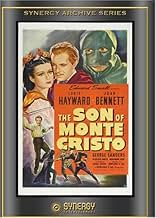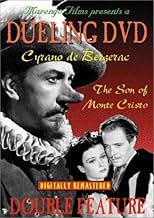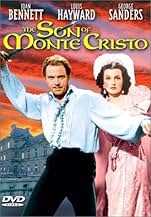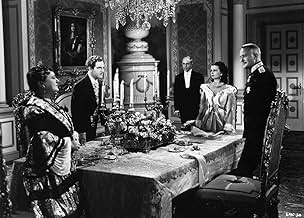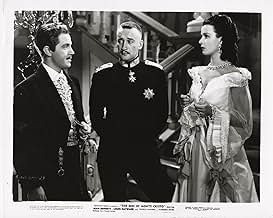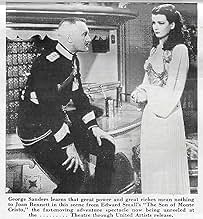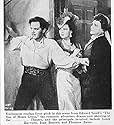Aggiungi una trama nella tua linguaGeneral Gurko Lanen is the dictator of Lichtenburg, a country set in the Balkans. With the help of Napoleon II, the rightful ruler Grand Duchess Zona aims to overthrow the general. She is al... Leggi tuttoGeneral Gurko Lanen is the dictator of Lichtenburg, a country set in the Balkans. With the help of Napoleon II, the rightful ruler Grand Duchess Zona aims to overthrow the general. She is also helped by the visiting Count of Monte Cristo.General Gurko Lanen is the dictator of Lichtenburg, a country set in the Balkans. With the help of Napoleon II, the rightful ruler Grand Duchess Zona aims to overthrow the general. She is also helped by the visiting Count of Monte Cristo.
- Regia
- Sceneggiatura
- Star
- Candidato a 1 Oscar
- 1 candidatura in totale
- Conrad Stadt
- (as Ian Mac Wolfe)
Recensioni in evidenza
George Sanders is superb as the ruthless Gurko Lanen, but a performance of this calibre in the role of the villain holds the danger of overbalancing the film in the absence of a totally outstanding performance on the part of his opponent. But the introduction of Louis Hayward's slender, charming Monte Cristo as an outsider into the cliche'd Ruritanian mix proves to be the vital spark that not only saves the film but catapults it to rank as a joyous classic of its genre. As Gurko Lanen sardonically observes, it is an adversary with a sense of humour who is dangerous.
No-one could claim originality for the plot. There are strong echoes of 'The Mask of Zorro' to be found, as our well-born young hero alternates the pose of a fop - suffering the scorn of his ladylove - with the role of masked defender of the downtrodden masses. But expectations are constantly subverted; like its title character, the film has the endearing knack of not taking itself too seriously.
This is one hero, for all his skill, who has been known to lose when launching himself gaily into battle against overwhelming numbers of his rival's henchmen; who takes his nom de guerre at the whim of a moment from the banner heading of an underground news-sheet; who shrugs off his enemy's imprecations and his lady's upbraiding both alike, with a merry grin; who clearly takes enormous enjoyment in sending himself up by playing the part of a foppish banker to deflect General Lanen's suspicions. In a nod to the Dumas original, the tool that gains him access to the General's plans and confidence is the prospect of a banking loan from the fabled Monte Cristo fortune, and despite his title the young Count is able to point out that, like Gurko Lanen, Edmond Dantes the elder was a self-made man.
For, if the hero is not entirely infallible - and all the more likeable for it - neither is the villain entirely without our sympathy. As we see in the opening scenes, Lanen is neither a fool nor a coward, and despite his cultured suavity he is the son of a stonemason, and proud of it; a gifted peasant who has dared to aspire, first to the rulership of his tiny country, then to the hand of the greatest lady in the land, the Grand Duchess herself. It is not a romance that the audience can possibly favour - the would-be suitor is too old, too brutal, too jaded to be a suitable match for young Zona - but it is hard not to wince at the haughty manner in which his courtship is dismissed. To this viewer at least, the proposal sounded genuine, evoking the old proverb that 'if she would not take him, still the lady might make him' - but any possibility for redemption is lost by the all-too-evident contempt of the Grand Duchess for the low-born upstart General.
(And I never could see why Baron von Neuhof's arrest for plotting to bring in Louis Napoleon's troops in order to return his own faction to power gets dismissed as "trumped-up charges", when Lanen's last-ditch resort to a similar bargain with the Tsar is trumpeted as a vile betrayal of his country....)
It's obvious from the start that this is one villain who is going to give the hero and his allies a run for their money; and so he does. Monte Cristo's flattery doesn't fool the General for an instant, though he is prepared to tolerate the fop as long as he remains useful, and the identity of the spy who ultimately betrays 'The Torch' has been skilfully established from the very first scenes. As soon as Lanen's suspicions are aroused he contrives, with only a little manipulation of those most loyal to his audacious guest, to discover both his secret identity and his concealed escape route in time to have him arrested and thrown in jail.
Ruthless and resourceful to the very last, Gurko Lanen keeps us gasping as he gambles everything to achieve his aims. Yet above all, it is Louis Hayward, in the irrepressible part of Edmond Dantes the younger (surely a kindred spirit of Simon Templar?) who really brings the picture to life. It will take all the wit and daring of an opponent as ingenious and endearing as the Son of Monte Cristo to stop the General... with a little help from Zona, who at the crucial moment yet again subverts the genre by saving herself!
Bloopers are few, although the Grand Duchess' achievement in adhering side-saddle behind her rescuer on the rump of a galloping horse is little short of miraculous, as is the apparent availability of sticky tape in 1865 for silencing the mouth of the Russian ambassador! During Lanen's balcony speech, a distant off-stage voice can faintly be heard prompting him line by line; while it's not beyond the bounds of possibility that the character would have had a prepared speech 'cued' to him in that situation, I somehow doubt that this was intentional :-)
The picture is a sequel to ¨The Count of Montecristo (1934)¨ also directed by Rowland V. Lee , though none connection exception of the father and son relationship. In the film there are action,adventures,melodrama,fencing duels, a love story,derring-do and is pretty entertaining and funny. Louis Hayward as masked avenger is very fine , his following films were a series of swashbucklers during fifteen years. Joan Bennett as the attractive duchess is enjoyable and enticing .Both played in 1939,¨The man in the iron mask¨, and again teamed up for this agreeable adventure.George Sanders as always plays a dastardly villain. Besides appear as secondaries actors,Clayton Moore(Lone Ranger),Montagu Love,Henry Brandon,Ralph Bird and Ian Wolfe. Direction by Rowland V. Lee is excellent, is famous in his films the extensive use of low angle shooting by means of a special device to heighten the impact of the scene . The movie was nominated to the best production design for Edward Boyle by its imposing sets though obtain none. The flick will appeal to swashbuckler enthusiastic and adventures cinema fans.
The same director had previously made THE COUNT OF MONTE CRISTO (1934) and this sequel to it re-unites the stars (Joan Bennett, Louis Hayward) and writer (George Bruce) of the definitive screen version of yet another Alexandre Dumas classic, THE MAN IN THE IRON MASK (1939) - directed, interestingly enough, by James Whale. Incidentally, these two - both, as is THE SON OF MONTE CRISTO itself, produced by independent Edward Small - are perhaps the classic adventure films I would most like to watch and I wonder which DVD company owns the rights to all three titles...
Still, the film is equally influenced by THE SCARLET PIMPERNEL (1934) - in its hero's dual personality of fop/crusader - and THE PRISONER OF ZENDA (1937) - the Ruritanian setting - and, despite being a 'B' movie at heart, it's stylishly handled (with Oscar-nominated art direction/set decoration). It also makes the most of its fine cast: good leads, wonderful villainy from George Sanders, a nice role for Ian Wolfe (billed "MacWolfe"!), and including three actors from Universal's Frankenstein saga - Lionel Belmore (as a bartender), Michael Mark (hilariously made up as a bishop) and Dwight Frye (in a 10-second bit as an embassy official).
Full of intrigue, swashbuckling and occasional moments of romantic byplay, it's handicapped by Bennett's ice princess manner of performing in these costume roles as a damsel in distress--beautiful but expressionless. LOUIS HAYWARD, on the other hand, is very animated and charming in the title role, showing prowess with the swordplay and finally getting the upper hand in a duel of wits and swords with Sanders.
It's enjoyable but full of deja vu for those who've seen other swashbucklers of this ilk. FLORENCE BATES has a few wry moments as Bennett's maid, and MONTAGU LOVE is effective as a wrongly imprisoned nobleman.
The musical score by Edward Ward is helpful in sustaining an air of adventure but certainly not one of his more notable scores.
Summing up: Standard entertainment that must have made Saturday matinée audiences happy in the '40s--but it's all just too familiar with no original touches.
Lo sapevi?
- QuizThirteen years after making this film, in which he played the villainous ruler of a fictional country called "Lichtenburg" (an obvious combination of the real-life small countries Lichtenstein and Luxemburg), George Sanders played a sympathetic role in the musical film Chiamatemi madame (1953), also set in Lichtenburg.
- BlooperThe wedding invitation is for Wednesday, May 25, 1865. May 25, 1865, was a Thursday.
- Citazioni
Edmund Dantes Jr.: I'm worn out climbing in and out of windows and up and down chimneys. It'll be such a relief to go through an ordinary door again.
- ConnessioniFeatured in Sprockets: Masters of Menace (1995)
I più visti
- How long is The Son of Monte Cristo?Powered by Alexa
Dettagli
- Data di uscita
- Paese di origine
- Lingua
- Celebre anche come
- The Son of Monte Cristo
- Azienda produttrice
- Vedi altri crediti dell’azienda su IMDbPro
- Tempo di esecuzione1 ora 42 minuti
- Colore
- Proporzioni
- 1.37 : 1
Contribuisci a questa pagina



